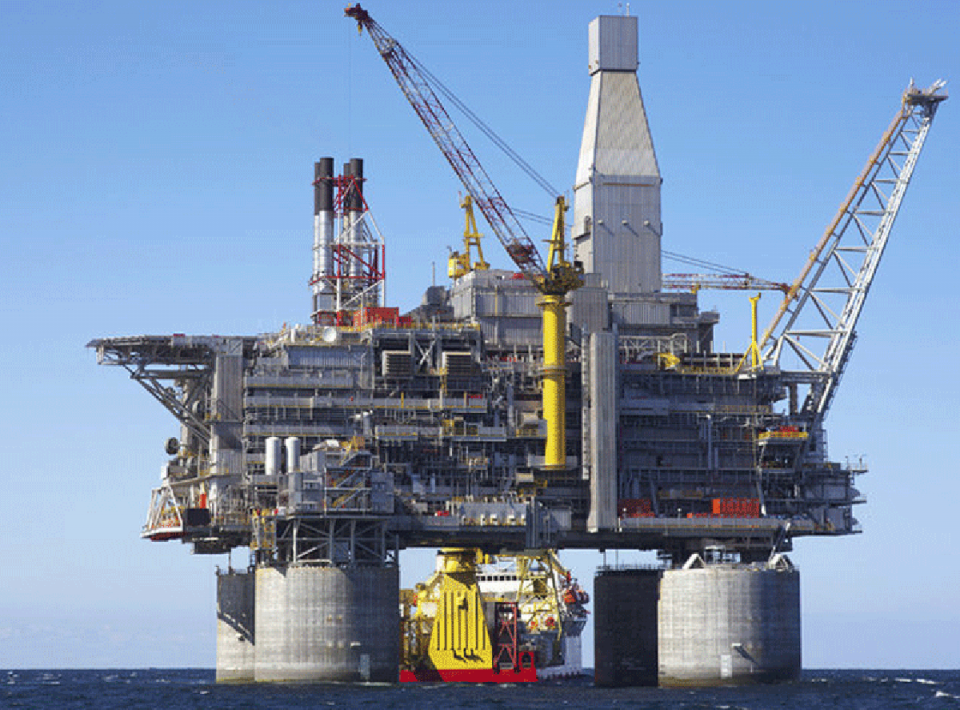Photo caption: Oil platform
The Federal Government says it has approved 37 new crude oil evacuation routes across the country as part of reforms to bolster production and curb theft.
It also said the number of crude oil rigs has increased from eight in 2020 to 44.
This was disclosed by the Chief Executive of the Nigerian Upstream Petroleum Regulatory Commission, Gbenga Komolafe, while speaking at the 24th edition of the NOG Energy Week 2025, on Wednesday in Abuja.
Delivering a keynote address titled “Positioning Nigeria’s Upstream Oil & Gas for Energy Security, Sustainability, and Economic Resilience,” Komolafe said the new evacuation routes were part of a broader strategy to restore asset integrity, ensure secure transportation of crude, and support the ongoing Project One Million Barrels initiative.
“With 37 new evacuation routes approved and implemented in collaboration with security agencies, we are curbing theft and boosting accountability,” Komolafe declared.
“The impact is already evident, Nigeria’s production has climbed from 1.46 million barrels per day to 1.7 million bpd. Our target is to reach 2.5 million bpd by 2026, and we’re well on our way. As you can see, the rig count has been growing linearly.
“After COVID-19, we moved from a regime where we had a rig count as low as 8 rigs in the Nigeria upstream. As of today, the rig count has increased to 44 rigs. Again, that is a huge achievement for us as a nation.”
According to him, Nigeria’s oil and gas sector is undergoing a historic transformation under the administration of President Bola Tinubu, made possible by the implementation of the Petroleum Industry Act and a string of new executive orders introduced in 2024.
“Let me be clear: under President Bola Ahmed Tinubu’s decisive leadership, we have seen a bold shift in policy direction. Executive Orders #40 on fiscal incentives, #41 on local content, and #42 on cost efficiency and contracting timelines have catalyzed over $16 billion in new investments in just two years,” the NUPRC boss said.
Komolafe noted that securing crude oil infrastructure and ensuring domestic energy resilience were key pillars of the ongoing reforms.
He said the commission’s Domestic Crude Supply Obligation initiative was now guaranteeing steady feedstock to local refineries, in a bid to reduce dependence on imports and strengthen Nigeria’s downstream value chain.
“Our focus is not just on exports. We are strengthening domestic supply chains and economic resilience by ensuring that our refineries receive the crude they need,” he said.
In addition to physical infrastructure and policy reform, Komolafe highlighted the Commission’s ongoing digital transformation programme, which aims to streamline regulatory processes and improve investor confidence.
“Through full-scale digitisation, we’re delivering speed, efficiency, and clarity to investors. Our platforms are transparent, data-driven, and responsive,” he added.
On the social front, the NUPRC boss announced that the *HostComply* platform, a digital tool for tracking host community obligations — has started to yield measurable impacts.
“We have brought real and transparent benefits to oil-producing communities. Peacebuilding, social license to operate, and trust are no longer buzzwords, they’re operational imperatives,” Komolafe noted.
On the climate front, he reaffirmed Nigeria’s commitment to achieving net-zero emissions by 2060 and warned that operators who undermine the gas flare-out initiative under the Nigerian Gas Flare Commercialisation Programme would face stiff sanctions.
“Let it be known: the Commission will not tolerate any producer that undermines this national climate-action programme. Regulatory action has already been taken against non-compliant producers who failed to meet flare capture deadlines,” he said.
“By next year’s NOG conference, we intend to showcase operational flare capture projects that reflect our climate ambition turned into reality.”
Komolafe concluded his remarks with a strong message to investors, urging them to take advantage of Nigeria’s momentum in upstream reform.
“Nigeria is not on the sidelines of the energy future, we are shaping it. With visionary leadership, bold reform, and a clear net-zero path, we are offering a pragmatic, equitable, and resilient transition model,” he said.
“The opportunities are real. The reforms are working. The future is now. To our investors, let me echo President Tinubu’s words: ‘Nigeria must not only be open for business; it must be irresistible for investment.’”
The CCE further pledged to “focus on deepening upstream investment, accelerating reserve development, scaling up production, and enhancing domestic energy security and sustainable growth.”
He added that NUPRC will, “Sustain transparent, competitive licensing rounds under the Continuous Acreage Licensing Framework.
“Accelerate frontier basin exploration and derisking. Fast-track reactivation of shut-in assets. Drive the 1MMBPD initiative through aggressive rig deployment, asset reactivation, streamlined approvals, and enhanced recovery techniques.
“Expand evacuation infrastructure to protect production. Deploy the Advance Cargo Declaration System to curb theft and improve transparency in export.”



